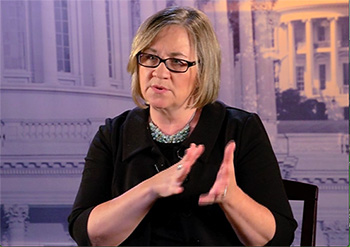
Guatemala Conference: Jo-Marie Burt
USC Shoah Foundation Center for Advanced Genocide Research will host the international conference “A Conflict? Genocide and Resistance in Guatemala,” at the University of Southern California, Sept. 11-14, 2016. The scholars profiled in this series were each selected to present their research at the conference.
Jo-Marie Burt spent years observing and performing advocacy work around the trial of General Rios Montt for the genocide in Guatemala. The experience left her in awe of the victims who testified and determined to help them and their country achieve truth and justice.
At George Mason University in Virginia, Burt is director of the Latin American Studies program and associate professor of political science. She also woks with the Washington Office on Latin America (WOLA) doing research and advocacy on human rights and transitional justice.
As an international observer of the trial of General Rios Montt in 2013, Burt saw firsthand how, despite the years of courtroom testimony and Montt’s initial conviction, the verdict was annulled. But despite the setbacks, Burt views Latin America as the forefront of efforts around the world to prosecute domestic grave human rights abuses. She is interested in researching the processes that must come together in order for a country like Guatemala to actually engage in the prosecution of former agents of the state for human rights abuses, and how its society perceives the conflict and who is to blame.
The survivors who testified in court during Montt’s trial are also of particular interest to Burt. These were mostly indigenous, non-Spanish speaking people whose communities are typically marginalized and oppressed in Guatemala – but they showed great strength and determination throughout the trial in order to achieve justice for themselves and their families.
Even after the verdict was annulled, they vowed to testify all over again in the new trial, Burt said.
“At the end of five years they’ve been put through the wringer, they’re exhausted, they feel anguish, they are angry about the slowness of the process, the bureaucracy, the feeling that the judges are favoring the defendants, and yet every week there they are at the trial, lobbying members of Congress, going to the press,” Burt said.
Their murdered loved ones are what keep them from giving up on their quest for justice no matter how difficult the journey.
“When you really get down to it, it is people who lost a mother, their sister, their brother, their father, their son,” Burt said. “It’s their love and their anguish at having lost that loved one that compels them to stay on this tortuous path of seeking justice.”
At the conference, Burt will speak on a panel on post-genocide justice with scholars Roddy Brett and Marta Elena Casaus. She said the speakers chosen to present at the conference have all worked diligently to understand the genocide and help the victims, and they represent some of the leading researchers and practitioners in the field.
“We’re all going to sit down and be engaged in this ongoing conversation collectively that I think will advance both our understanding of the genocide but also the efforts to achieve truth and justice for the victims of the genocide. That’s still a task that is incomplete,” she said. “So many of these people spent so much time and energy working towards that and [USC Shoah Foundation] is bringing together so many of them that it’s exciting to think about the kind of conversations and possible collaborations that can emerge from this.”